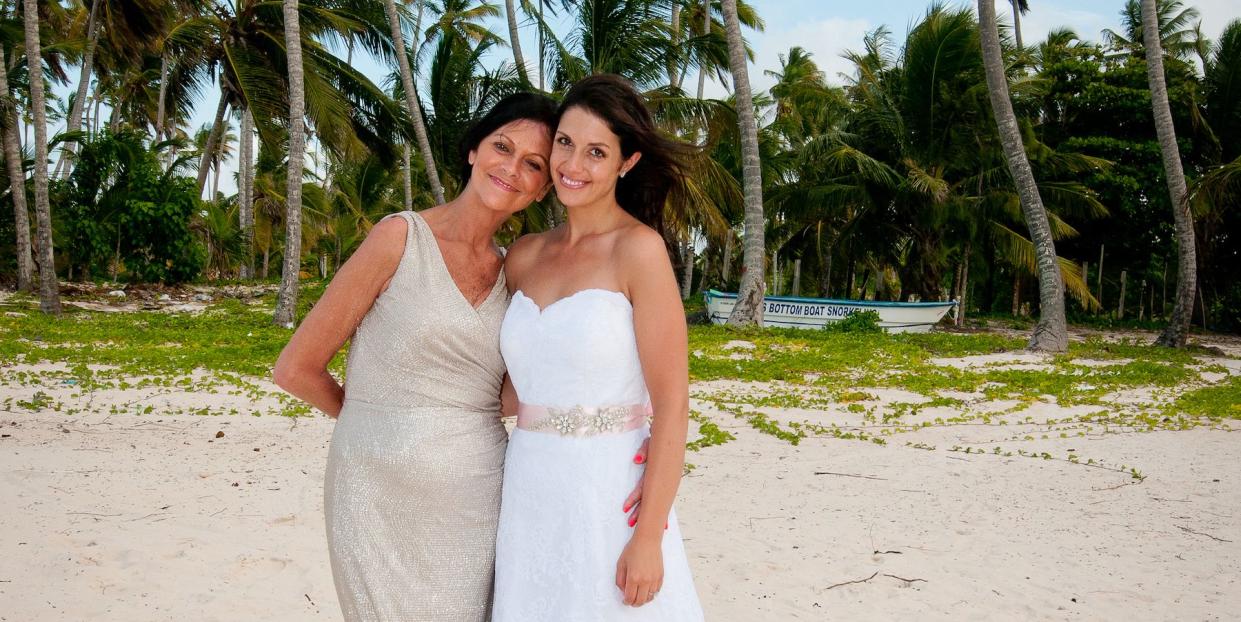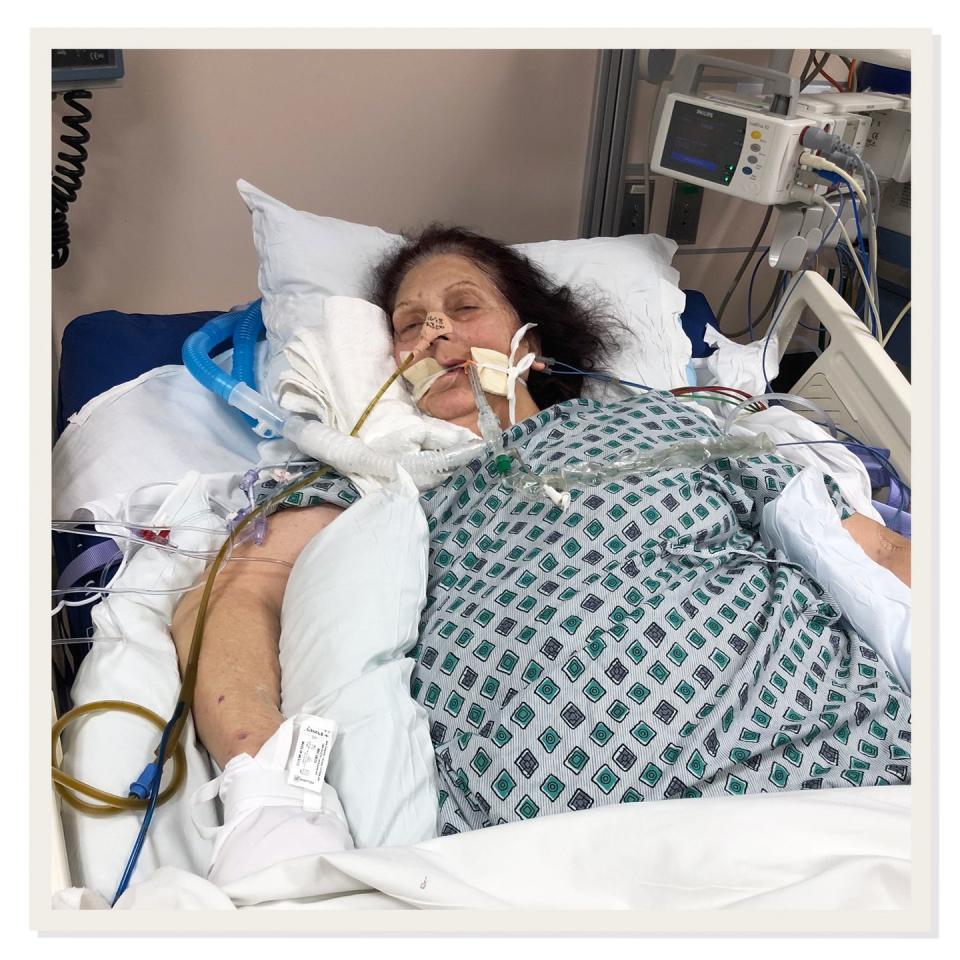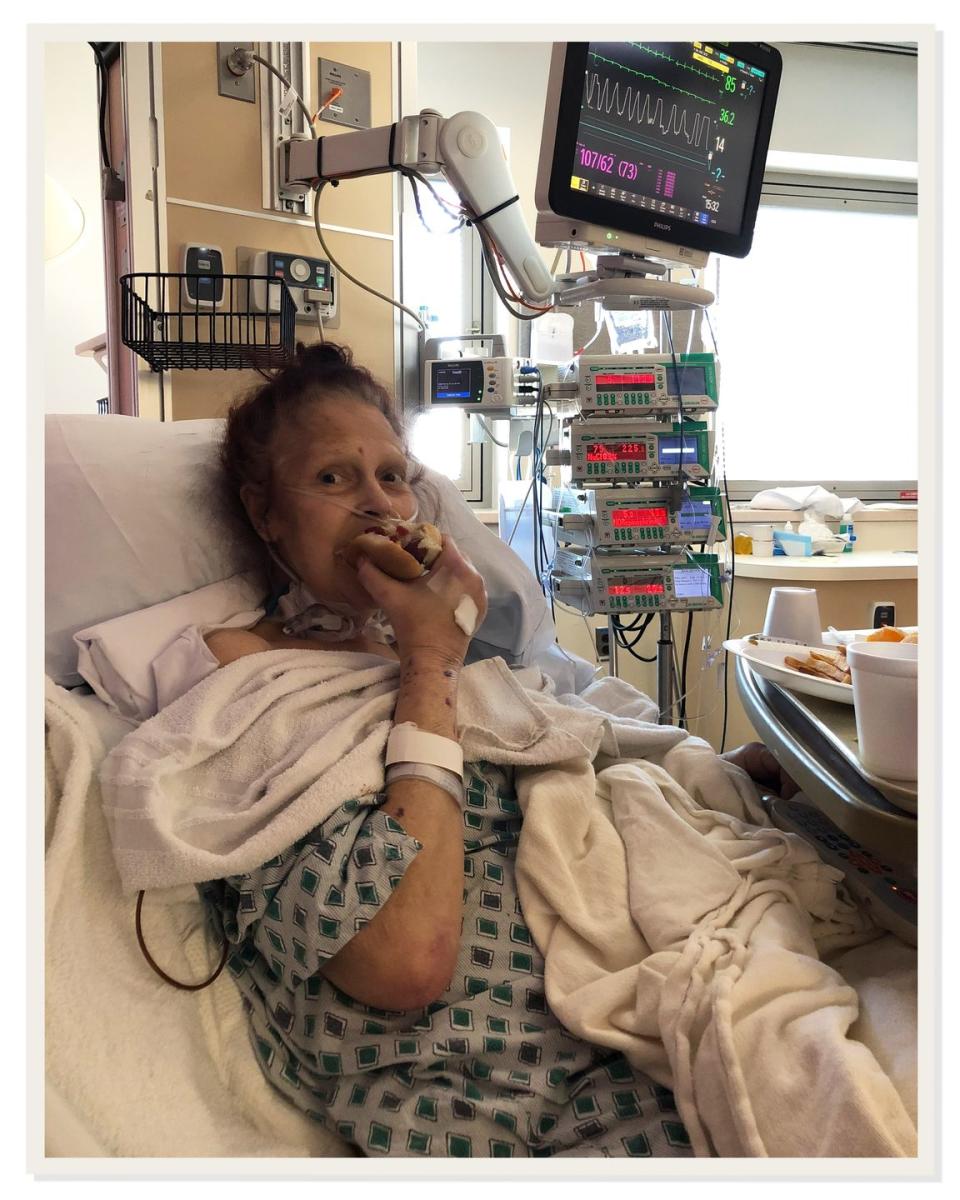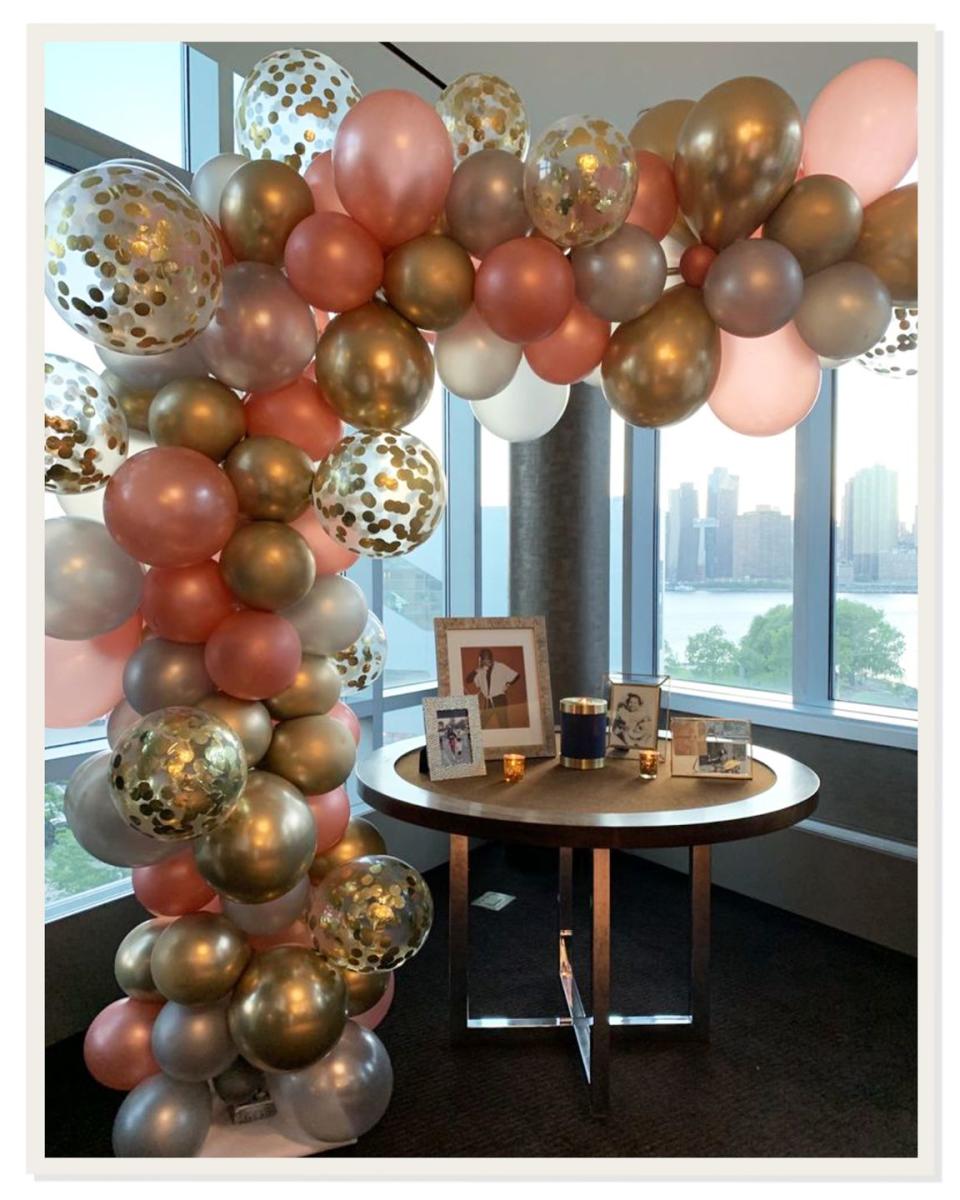Hi, My Name Is Brie, and My Mom Was an Opioid Addict

I was swiveling on a bar stool in Brooklyn that was held together by decades-old duct tape, trying to tune out the Tuesday night revelers shouting trivia answers in hopes of a free shot. Sipping body temperature tequila, I wedged my crossed fingers into my coat pocket like I did when I was a kid looking for protection, hoping that if I kept them tangled tight enough, my mom would live through the night.
My husband came back inside after calling his physician friend. His buddy said it sounded like the doctors were taking all the right measures, but I can read him well, so it was obvious this pal gave it to him straight. Like the ER doc told me earlier, I knew “She’s very sick” was code for “Say your prayers”—just as “They’re taking the right measures” meant, “Hold your wife close tonight. Or, at least let her eat Cheetos in bed. This might be the last time she’ll be able to live with herself.”
Because the thing about having a loved one with addiction is you can’t help but feel like you’re to blame. If only I’d gotten my mom the right help, found the right rehab, practiced tough love, never practiced tough love, was firmer with that doctor who was so liberal with his Rx pad, she wouldn’t have been found alone by her social worker, lips black, oxygen cut off from her organs, barely there.
That was November 2018.
A prescribed opioid addict, my mom’s doctor had been doling out increasingly high doses of Oxycodone and Percocet for over a decade to numb chronic pain brought on from a series of slipped discs and other occupational hazards of her life as a hairdresser. (Seriously, that’s a thing, so tip your stylists generously.) And sometimes, still high on her cocktail of sleep meds, she’d forget that she already had a double and would order another round, leading to an overdose.
Thinking in imaginary Instagram stories became a natural coping mechanism for me.
Unlike more sympathetic diseases, there’s such a stigma surrounding addiction that for years, I hid my all-consuming double-life from everyone I could. When other family members were diagnosed with Leukemia, the reactions included the type of kindness reserved for victims. Nurturing hugs and “F—k cancer. We’ll get through this together!” But when you tell someone your mom is an opioid addict, there’s no “F—k oxy.” My truth is met with recoils, lack of understanding, and an assumption that my mom was a selfish person, as vile as the dirty diapers her immobile body was left in daily while she was “recovering.”
She wasn’t vile, or selfish. She was depressed and dependent on a substance that can become habit-forming after only five days of use.
According to the latest CDC stats, more than 70 percent of the 70,630 drug overdose deaths in 2019 involved an opioid—and that record number has continued to rise. Since the COVID-19 pandemic, which led to overwhelming isolation, the epidemic has become even more deadly, according to the American Medical Association, with over 40 states citing an uptick in fatalities by September 2020. “Deaths from drug overdoses remain higher than the peak yearly death totals ever recorded for car accidents, guns, or AIDS, and their acceleration in recent years has pushed down overall life expectancy in the United States,” the New York Times reported last July.
Yet despite the toll this affliction takes on so many families, there’s still a preconceived notion that all victims are lazy junkies who don’t want help. Which is why, rather than explain myself or make apologies for my mom, I simply never talked about it. Rather than burdening friends with my reality—nothing kills a Margarita Monday quite like chatter about the bile stains I’d just cleaned off my mom’s carpet—I instead began documenting these moments in my mind through fantasy social media posts. As someone who came of age in the era of the emo AOL away message, somehow, thinking in Instagram stories became a coping mechanism for me.

Of course, I’d never actually share any for pity likes. But to keep myself entertained while I shuttled back and forth from New York City to her Long Island hospital or her nursing facility in the suburbs, I started exclusively thinking in ironic IG captions, like: "#DEAD (literally!)"
It’s fun. You should try it the next time you’re under duress.
After my mom’s overdose, blood stopped flowing to her intestine, so they fixed the glitch by redirecting her waste to a hole on her stomach, instead of through...well, you know. Caption? "Another #ostomybag leak. #poophappens." I giggled to myself after finding her filth-smeared tummy in the nursing home with a puppy training pad tossed over her open wound. "#EveryBodyIsABikiniBody. Looked cute. Might delete later."
On the weekends, it was time for the "#SelfCareSunday" series. Fake followers were treated to fictitious snaps (portrait mode, always) of the battery-operated votives brought in to spruce up the space she shared with a dementia patient prone to night terrors. Caption: "A gal can never have too many #candles or #catheters."
The holidays, were of course, ripe for make-believe memes: “How It Started Vs. How It’s Going. #NaughtyList"
"#FeastoftheSevenHospitalCafeteriaFishes"
And knowing how well 90s nostalgia plays on the millennial platform, when my mother handed the crumpled-up napkin that held the part of her tongue that had fallen out (another charming gift from drug-induced oxygen deprivation), all I could think about was how much the piece resembled the mystery flavor Airhead—white and rubbery. I mused that if I was really morose, I’d photograph a flat lay of the iconic candy with my old Steve Madden platforms and Claire’s body glitter for some scroll-stopping shimmer. "TBT #90sgirl #SunsOutTonguesOut."
These macabre visions, in direct opposition to the perfect pictures I’d see scrolling through my actual Instagram feed at my mom’s bedside—of matcha lattes, pumpkin patches, and pizza pool floats (okay, I’m guilty of that last one)— allowed me to “speak out” about what life with an addicted parent is like. Even if I was only talking to myself.
Though ultimately it was drugs that caused my mom’s body to shut down, I wasn’t raised by an addict; she’s still vivacious in my memories. She was the infectiously charming single mom who had all my 14-year-old friends over for Sex and the City Sundays because their parents wouldn’t let them tune in. (Sorry, Mrs. Aronson!) For years, I watched her make others feel beautiful, one haircut at a time, while I sat in the chair next to her everyday after school, listening to the sage advice she’d dole out to clients.
When she couldn’t take the body aches anymore, she went on disability and started living off the government (plus my paycheck). But hey, at least Medicaid covers painkillers.
In the years leading up to her final overdose, I kept her entertained with all the streaming services money could provide, got her the most adorable puppy to replace me, and sent her Seamless every time she blew her food stamps on Sour Patch kids. But I was suffocating in shame that I couldn’t provide a bigger life for her, even if she wasn’t trying to do anything for herself. And how could she, when opioids were numbing her senses—robbing her, an already lonely woman, of incentive? The pills gave her a way, without having to ask her daughter for cash, to shave some hours off the clock.
I’d give in to each text request, ignoring any promises I made to myself that I’d stop enabling her. I wouldn’t yield to her whims until she demonstrated that she was making an effort to wean off the pills she was given every month. Pills she "needed." But if I said no, she’d give me an expert guilt trip about how she never denied me. Or, worse, she’d threaten to kill herself. A powerful trump card when she had the tools concealed in the vials she hoarded in boots in her bedroom closet. After all, she’d come so close before without even trying. I couldn’t have it on my conscience—already so fat with self-reproach—that if only I had ordered her a hot dog, her death wouldn’t be on my hands.

Still, it was the dream editions of Instagram posts that kept my sense of humor kicking through the trying times she remained confined to her neglectful care facility—where she was sent to recoup after three months spent in a hospital bed caused her muscles to atrophy.
I wondered if by strictly keeping this part of my existence to a pretend Instagram account in my head, I was betraying my peers who were also trying to present as “normal” while coping with the messy effects of loving an addict. Perhaps if I made these sardonic posts public, I could help someone who was suffering in silent shame. Together, through slumped over photos of our moms, we could show the toll addiction takes on families—because we’re not the ones who are too drug-numb to feel how much it hurts to cherish someone who’s not mentally there. I wouldn't ask questions. I wouldn't tell them it gets better, because it probably doesn’t. I'd just assure them they're not to blame. That they did their best, despite the gnawing voice telling them that their best will never be good enough.
My mom died on Mother’s Day, 2019. I’d like to think it was her having the last laugh—one final reminder that I was her whole existence. The night before she passed, I watched her tearfully read the card I wrote—it explained that I understood her, that I forgave her, and that I’d find a way to forgive myself for never being able to fix her. For not having the courage to force her to go to rehab, and for failing to convince her to find a doctor that would experiment with alternative ways to treat her crippling afflictions.
She was groaning in discomfort from a stomach pain that her aides blamed on the Chinese food I smuggled in. It was getting late, and my husband and I were eager to head back to the city after a long day of watching her vomit Lo Mein into a bedpan, knowing there was nothing I could really do to bring her comfort. She asked us to stay a bit longer, but we had a train to catch, so I kissed her goodbye.
A few hours later, I learned that they were sending her back to the hospital. The call came around 4 a.m. that she died en route.
As I’m coming up on my third Mother’s Day without her, it’s getting slightly easier to stop thinking about the look she gave me, silently asking me to remain by her side. I am also filled with gratitude that her nursing home chapter ended before the coronavirus began, or else I would have shared the burden of so many others who couldn’t be there to provide a glimmer of sunshine for their interned loved ones.
(Though I do wish she was alive to see my husband’s shoulder-length COVID curls. She always teased him for his boy band flip.)

Months after I hosted a tequila- and balloon-filled (two of her favorite things) memorial celebration, I did ultimately share something mawkish, but also authentic on Instagram. For awhile, the post was holding steady at 143 likes—our shorthand for “I Love You.” It felt like a sign my mom wanted our story told, because she saw my grief, and as an empathetic armchair therapist, she knew that it was a sadness I had in common with so many others who have lost addicts and mourned not just for the person, but for the memories they could have made together if insobriety hadn’t robbed them of the chance.
Or maybe she just liked the bad ass late 70s photo I chose of her in her pre-narcotic glory—Bo Derek cornrows (before she knew what cultural appropriation was), cutting shears in hand, and her signature swagger. Even though I wasn’t yet born when that shot was snapped, it’s one of the ways I choose to remember her—as a woman who’d go on to love her daughter more than anything, even though that intensity would never be a match for the paralyzing power of the pills hidden away in the seams of her purse.
You Might Also Like

